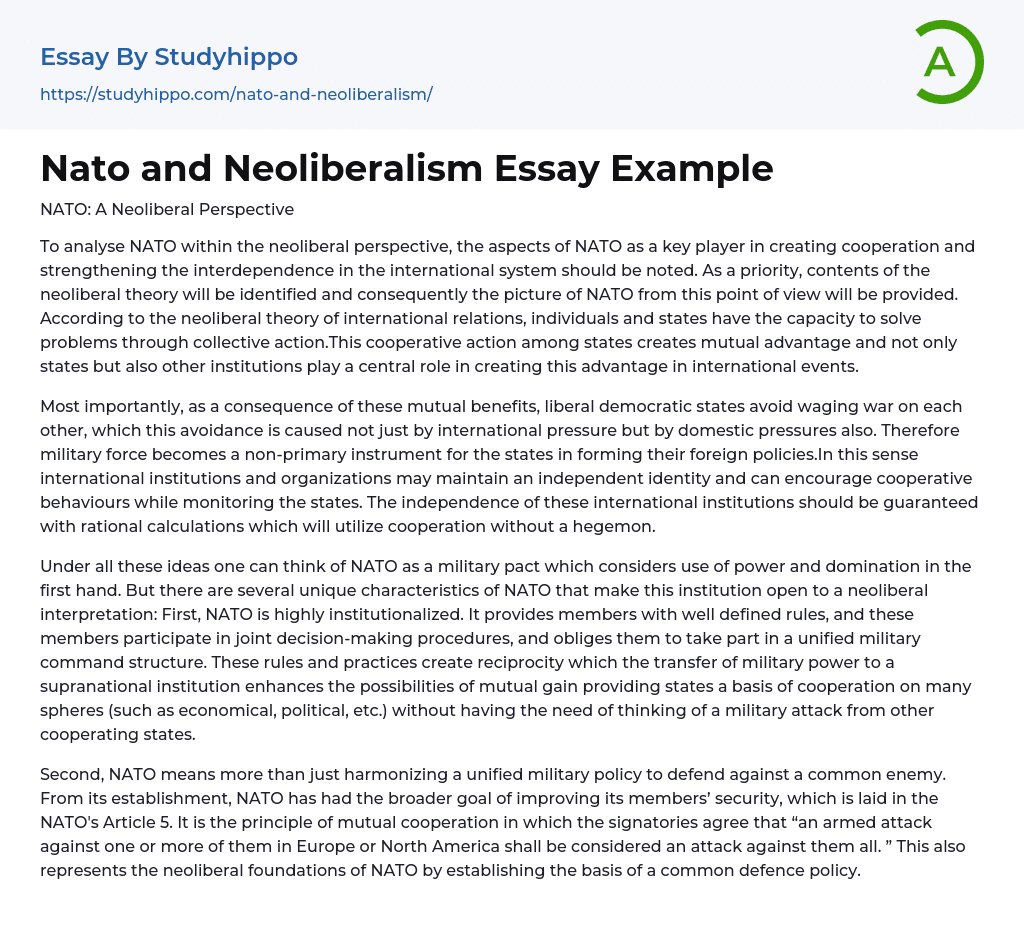NATO: A Neoliberal Perspective
To analyse NATO within the neoliberal perspective, the aspects of NATO as a key player in creating cooperation and strengthening the interdependence in the international system should be noted. As a priority, contents of the neoliberal theory will be identified and consequently the picture of NATO from this point of view will be provided. According to the neoliberal theory of international relations, individuals and states have the capacity to solve problems through collective action.This cooperative action among states creates mutual advantage and not only states but also other institutions play a central role in creating this advantage in international events.
Most importantly, as a consequence of these mutual benefits, liberal democratic states avoid waging war on each other, which this avoidance is caused not just by international pressure but by domestic pressures also. Therefore military force
...becomes a non-primary instrument for the states in forming their foreign policies.In this sense international institutions and organizations may maintain an independent identity and can encourage cooperative behaviours while monitoring the states. The independence of these international institutions should be guaranteed with rational calculations which will utilize cooperation without a hegemon.
Under all these ideas one can think of NATO as a military pact which considers use of power and domination in the first hand. But there are several unique characteristics of NATO that make this institution open to a neoliberal interpretation: First, NATO is highly institutionalized. It provides members with well defined rules, and these members participate in joint decision-making procedures, and obliges them to take part in a unified military command structure. These rules and practices create reciprocity which the transfer of military power to a
supranational institution enhances the possibilities of mutual gain providing states a basis of cooperation on many spheres (such as economical, political, etc.) without having the need of thinking of a military attack from other cooperating states.
Second, NATO means more than just harmonizing a unified military policy to defend against a common enemy. From its establishment, NATO has had the broader goal of improving its members’ security, which is laid in the NATO's Article 5. It is the principle of mutual cooperation in which the signatories agree that “an armed attack against one or more of them in Europe or North America shall be considered an attack against them all. ” This also represents the neoliberal foundations of NATO by establishing the basis of a common defence policy.
- Absolutism essays
- Appeal essays
- Bourgeoisie essays
- Contras essays
- Corporate Governance essays
- Corruption essays
- Democracy essays
- Democratic Party essays
- Developed Country essays
- Dictatorship essays
- Elections essays
- European Union essays
- Federalism essays
- Foreign essays
- Foreign policy essays
- Gentrification essays
- Hillary Clinton essays
- Income Tax essays
- International Relations essays
- John Marshall essays
- John Stuart Mill essays
- Left-Wing Politics essays
- Liberty essays
- Military essays
- Monarch essays
- Monarchy essays
- Political Corruption essays
- Political Party essays
- Political Science essays
- President Of The United States essays
- Public Service essays
- Red Cross essays
- Reform essays
- Republic essays
- Revenge essays
- Social Security essays
- Sovereign State essays
- State essays
- Supply essays
- Terrorism essays
- United Nations essays
- World Trade Organization essays
- Activism essays
- Communism essays
- Conservatism essays
- Liberalism essays
- Marxism essays
- Nationalism essays
- Patriotism essays
- Policy essays




